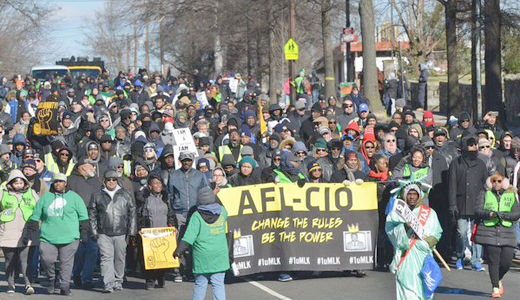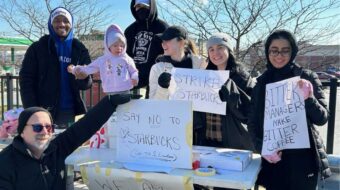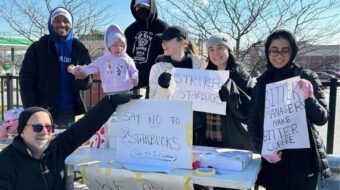
WASHINGTON (PAI) — Saying of the economic and political elite, “When they divide us up, they can beat us. When we stick together, they can’t,” AFL-CIO President Richard Trumka declared workers of all races, classes and genders must unite to reclaim the U.S. future.
That means uniting around a common agenda of raising incomes and equality for all, regardless of race, color or sexual orientation, he said. But that unity should not obscure the fact that a difficult and honest discussion on race must continue, Trumka added.
Trumka’s comments about the need for unity came during a question-and-answer session at the opening of the AFL-CIO’s annual Martin Luther King Conference, a 3-day event from Jan. 15-17 in D.C. Other speakers repeated his themes, with variations.
The conference, entitled “Change The Rules, Be The Power” revolved around organizing, politics, issues and activism – including in-the-neighborhoods activism by its 1,000 delegates on Jan. 16 — and openly discussing race.
It did not come to any conclusions on that issue, though at least one speaker urged the federation to openly endorse and back the Black Lives Matter movement, which has pushed the discussion to the forefront of U.S. consciousness. A special AFL-CIO race and justice commission is holding a series of hearings nationwide to get the painful discussion going.
On both race and economics, “No real change ever comes without a crisis,” added federation Executive Vice President Tefere Gebre. “And we are in crisis in this country. Which road we take – the danger or the opportunity – is up to us.”
The MLK conference also covered issues ranging from ending mass incarceration of minorities and immigrants to the forthcoming U.S. Supreme Court ruling in Friedrichs that could make every state and local government a right-to-work fiefdom. One speaker noted that such a ruling would disproportionately harm minorities and women.
Trumka stressed that solidarity reveals there is more that unites workers across racial, gender and class lines than divides them, despite the constant years-long efforts of the political and economic elite to do so.
But the conference’s big secondary theme was a need to greatly increase organizing, both by the labor movement and its allies-faith groups, community groups, women’s groups, civil rights groups, environmentalists and others-to add to ranks and to marshal resources and people to challenge right wingers, both in the 2016 election and beyond.
“The challenge to the labor movement is that we should have 100 times and a thousand times more organizing campaigns than we do now,” said Maria Elena Durazo, former L.A. County Federation of Labor executive director, now a vice president of Unite Here.
“Unless and until we identify and train leaders on how to take on the boss in a lot more workplaces, we’ll be over there,” Durazo added, gesturing to a far corner of the room during the small-group session at which she spoke.
But while participants agreed on the overall goals, they differed on how to achieve them. Some advocated just tweaking present organizing efforts.
“We don’t have to reinvent the wheel,” said Rosa Rodriguez, Secretary-Treasurer of Steelworkers Local 1010 in Indiana. “But we have to sit down and see what it is that benefits the workers the best-and then go into that issue as one.”
Others called for specific campaigns to organize African-American, Latino and immigrant workers, citing successful pilot projects in Los Angeles and elsewhere to do so. Still others said the organizing must stress broad economic themes and lay out the case against the rich and their so-far successful manipulation of politics and the economy.
Many speakers, discussing recent events, said there must be more and more open discussion about race and particularly the racism of the entire criminal justice system, including the police, local district attorneys and the courts.
That issue came to the fore after Ferguson, Mo., police officer Darren Wilson fatally shot unarmed African-American teenager Michael Brown more than a year ago. It has remained on the national agenda due to similar confrontations since then in Chicago, Baltimore, the Twin Cities and elsewhere.
As Trumka said then, and repeated at the conference, “a (union) brother shot a union sister’s son.” Brown’s mother is a United Food and Commercial Workers member.
The depth of the problem goes beyond just police-minority confrontations. One activist described taking 150 union, progressive and philanthropic leaders to interview prisoners at San Quentin, to let them hear and feel the real impact of mass incarceration – often for non-violent offenses – on prisoners, their families and their communities.
And when those prisoners are freed after serving their terms, that speaker added, they often can’t get mainstream jobs, including union jobs, because they have to “check the box” that said they were formerly in prison.
Another pointed out unions endorsed the Cleveland District Attorney whose grand jury did not find fault with a police officer‘s fatal shooting of Tamir Rice, a 12-year-old African-American boy. She said there have been six such shootings in Cleveland, and no indictments. She demanded unions should ask themselves why they’re backing that DA.
Photo: AFL-CIO Twitter.












Comments